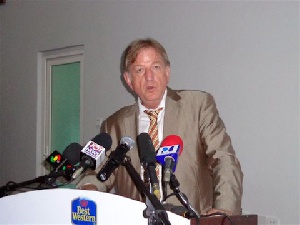The Head of the European Union Delegation to the country, Claude Maerten, has given the strongest of indications that Ghana, together with Nigeria, Ivory Coast and Senegal, has agreed in principle to sign the contentious Economic Partnership Agreements.
Mr. Maerten said after ECOWAS leaders failed to reach a consensus on the EPA during its sitting early this year, a group of four countries led by Ghana asked that it will be allowed time to review the agreements.
The countries, he said, have since given assurance of their readiness to sign the EPA in its original form.
“The group looked at the subject or the issues and our information is that three weeks ago, Ghana made a positive recommendation to other countries to proceed with the signature of the original EPAs. That's very much welcome,”
Speaking at EU-Ghana Business Forum last week, Mr. Maerten said, “We all hope that when it comes to the 1st October 2014, there will be no discontinuation of faith either from Ghana or Europe and we will have the signature of Ghana and ECOWAS.
But the Economic Justice Network (EJN), one of the most vocal critics of the EPA says ECOWAS must analyse other workable alternatives before agreeing to the controversial trade deal, which it warns will cripple domestic industries if accepted in its current form.
The network, which includes civil society think-tank Third World Network-Africa, the Trades Union Congress, the Ghana Chamber of Commerce and the Christian Council, said government can use part of the import tariff revenue it will save from not signing the EPA to absorb the taxes that will be slapped on exporters by the EU.
Without the EPA, 72 percent of Ghana’s exports to the EU will still benefit from duty-free, quota-free access while 28 percent – mainly tuna, fruits and vegetables, and cocoa butter and paste –will face duties, according to Tetteh Hormeku, coordinator of the network.
The combined import duty of these three major product categories is US$52 million annually, he said, adding that government can absorb this amount using part of an estimated US$416 million of import-tariff revenue that will be saved if the EPA is not signed. Support can also be given to these industries to find new markets.
“A significant number of countries are doing this, including Namibia, which is helping its beef sector diversify while not signing the EPA,” Mr. Hormeku said. “In any case, the preferences which the exporters currently enjoy –and which will be protected with the EPA – are being eroded, and will be very little by the end of the?Doha round of negotiations. So most Ghanaian exporters have to diversify in the long-term and become competitive outside preferences.”
Ignoring this option, which will safeguard revenue, jobs, policy space and national sovereignty, will deliver a net cost to the nation, he stressed.?Under the EPA, ECOWAS members get full, duty-free and quota-free access to EU markets. In return, the
EU will gain access to 75 percent of ECOWAS’ markets over a 20-year phase-in period. The EU will also give ECOWAS €6.4billion to manage the cost of adjusting to the EPA.
But “since most of these European goods enjoy better conditions of production, they will out-compete domestic products which are either similar or substitutable,” Mr. Hormeku said.
“These are also sectors that don’t export to Europe, but rely on the domestic and regional market. Signing the EPAs will destroy their domestic market.”
Comparing potential jobs that would be threatened, he said less than 5,000 jobs in the local economy would be put at risk if the EPA is not signed, whereas a minimum of 43,000 direct jobs could be lost if the EU is granted unfettered access to the domestic market.
The EJN also repeated its criticism of the Most Favoured Nation (MFN) clause in the EPA, which guarantees the EU equal terms to any bilateral trade deals ECOWAS may negotiate with other parties in future.
The network said this clause limits the possibility of Ghana or West Africa entering into any trade agreement with other developing countries such as China, India or Brazil.
Without the EPA, Ghana has the large ECOWAS market to tap into, with promising prospects in financial services and infrastructure, the EJN argued.
But the Trade and Industry Minister, Haruna Iddrisu said the concerns of critics of the agreement have been considered and that government will not enter into any deal that will be detrimental to its fortunes.
“We, as ministers and technical committee, have looked at matters in terms of market access, custom unions, and many other related issues which hitherto have held back this relationship in the last decade…
We cherish and value our relationship with the EU not because it’s the destination of our exports, but we also recognize the fact that many of the investment in Ghana are EU-led.
Mr. Iddrisu, also speaking at the EU-Ghana Business Forum, aimed at bringing together European business network and Ghanaian policy makers and private sector players to promote a dialogue on trade issues, said:
“What Ghana has further asked for is that this relationship (EPA) should not lead to a substantial loss of jobs, revenue and investments. We will support a regional decision, which I believe will be examined and quickly concluded by the Ecowas Heads of States when they meet October 1.
Business News of Monday, 26 May 2014
Source: BFT

















